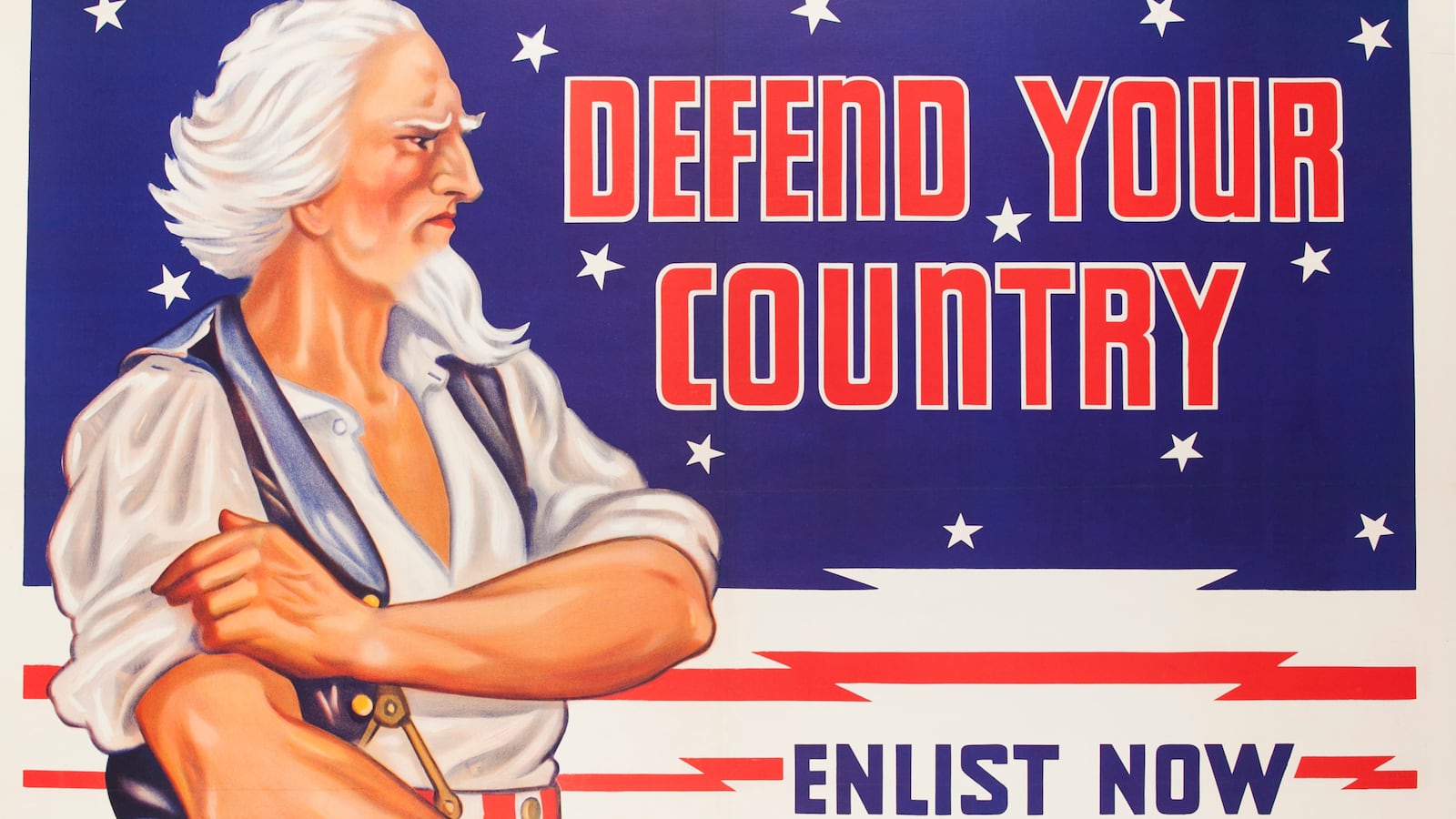Every day before dawn, brave men and women of different races and backgrounds rise as one, united by a common cause. They march together in formation, kept in step by their voices joined in song. These workers leave their communal housing arrangements and go toil together “in the field.” While they are out doing their day’s labor, their young are cared for in subsidized childcare programs. If they hurt themselves on the job, they can count on universal health care. Right under your nose, on the fenced-in bases you drive past on your way to work or see on the TV news, a successful experiment in collectivization has been going on for years.

In an era defined by 13 years of continuous war, most Americans still seem to regard the U.S. military as a mysterious and remote way of life. Then a tragedy involving a soldier or veteran happens, and reliably experts come forward to explain the strange customs of the folkloric troop in its native habitat. Shame that so many of the experts seem to have barely a clue what the military is really like. They’ve studied it from a distance without getting a real feel for the customs and characteristics of the culture they’re eager to explain.
It probably comes as a surprise to many, but the army may have more in common with Norway than Sparta.
The U.S. military is a socialist paradise. Imagine a testing ground where every signature liberal program of the past century has been applied, from racial integration to single-payer health care—then add personal honor, strict hierarchy, and more guns. Like all socialist paradises, the military has been responsible for its share of bloodshed, but it has developed one of the only working models of collective living and social welfare that this country has ever known.
Not that the leadership always gets things right and protects those who serve. Over and over again, the military has betrayed its own best principles and traditions, from the practical exclusion of non-white veterans from the World War II G.I. Bill to the massive lapses and failures in the VA system and today’s rising dependence on food stamps in military homes. The military suffers from the same problems that all mammoth bureaucracies do but less so, because its membership largely believes in its core values and has seen those values upheld often enough to expect action when they are betrayed.
So what’s life like for those in uniform living in the socialist paradise?
The military is an enormous jobs program. There are more than 2 million active duty and reserve members of the armed forces spread out between bases in more than 150 countries. As with any employer of that size, you’ll get a range of answers about working conditions depending on who you ask and how much they got screwed by the bureaucracy, let down by their leaders, or punished by circumstance.
Across the thousands of bases where soldiers, marines, and airmen live with their families, a few common features shape military life. It’s the commonness of the life, actually, that makes it unique. From Fort Bragg to Camp Pendleton, there is a shared experience on a scale that exists almost nowhere else in America.
Millions of people on military bases live in communal arrangements. They participate in centrally run programs that govern the most basic and fundamental aspects of their lives, from their housing and children’s educations to where and how they shop for food.
Service members and their families live for free on base. People living off base are given a stipend to cover their housing costs. They shop in commissaries and post exchanges where prices for food and basic goods are considerably lower than at civilian stores. Troops and their families count on high-quality education and responsive universal health care. They expect to be safe at home, as bases, on average, have less violence than American cities of comparable size. And residents enjoy a wide range of amenities—not just restaurants and movie theaters but fishing ponds, camp sites, and golf courses built for their use.
Of course, some bases are better than others. But even the most austere provides a comprehensive network of social welfare provisions and a safety net that does not differentiate between a junior employee and an executive. (Though with budget cuts now looming, Congress is trying to gut some of those benefits while wasteful programs go untouched.)
The pay difference, and thus the lifestyle difference, between a junior troop and a senior general is a small fraction of the disparity that separates the salary of an average worker from that of a top CEO in the private sector.
And speaking of management and floor workers, as stratified as the military’s rank system is, it is also one of the country’s last engines of social mobility. A young enlistee from a poor background with no higher education can rise through the ranks. The military is one of the only institutions in America, maybe the only one, where the mailroom-to-boardroom scenario still happens often enough to be more than just a self-serving myth.
On social issues, the military has consistently been ahead of the country at large. President Truman ordered the armed forces desegregated in 1948, shamefully late but two decades before the Civil Rights Act of 1964. And since the repeal of Don’t Ask, Don’t Tell in 2010, gay service members have been getting married and collecting the same benefits as their straight peers, while the issue still works its way through the states.
Yes, the military is a machine that is engineered to kill. It is also one of America’s most meritocratic institutions, and one of its most progressive and generous in terms of workers’ benefits.
No one will be more infuriated by the comparison to socialism than the conservative-leaning members of the military. And there are, of course, innumerable and essential ways in which the military isn’t socialist at all. It’s a volunteer force that works as well as it does because the organization fulfills its obligations to the people who sign up. Most people sign up because they’re looking to better themselves and get more opportunities than they had back home. They stay if they believe that the rules are applied fairly and they can get ahead on their merits.
Upholding the contract that underwrites the service of the volunteer military requires more than just providing resources and distributing benefits. To maintain the loyalty of the foot soldiers the military brass depends on, the leadership needs to show that it can hold itself accountable. It fails often at that task but succeeds enough to be one of the few national institutions left where people take each other at their word.
Editor's note: This article has been corrected to reflect that most military childcare programs are subsidized but not free.





